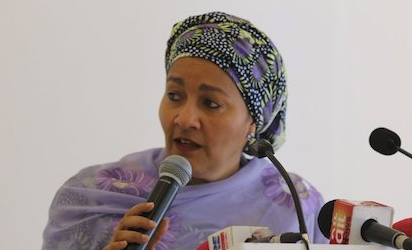
Amina Mohammed: UN deputy secretary-general
IN January this year, outgoing environment minister, Amina Mohammed, assumed duty as the fifth Deputy Secretary-General, DSG, of the United Nations. The event surprisingly went without fanfare and drums from our usually cacophonous press. Ms. Mohammed may not be a household name, but she’s well-known in civil-society circles, with quite a high reputation among the international development set.
Secretary-General Antonio Guterres made an inspired choice in appointing Ms. Mohammed to the plum job; knowing that an African Muslim woman with mixed English-Nigerian parentage would present a fresh and reassuring face of the UN to the rest of the world. She will go down in history as the first Nigerian national to hold the Number two job.
A number of Nigerians have held high positions in the United Nations. The late Simeon Adebo, perhaps our greatest civil servant ever, was Executive Director of the UN Institute for Training and Research, UNITAR, from 1969 to 1972; a role that went with the rank of Under Secretary-General , USG.
Professor Adebayo Adedeji, Executive Secretary of the UN Commission for Africa, UNECA, also held the rank of Under Secretary-General; a much maligned figure in the Western world because he dared to stand up for Africa when the Bretton Woods institutions sought to foist on us their controversial structural adjustment programmes in a manner that smacked of re-colonisation. A distinguished economist and statesman, Adedeji has been cruelly blacklisted by our Roman proconsuls from any form of involvement in international development circles.
My esteemed teacher, Professor Gambari, Under Secretary-General for Political Affairs, regarded as the de facto Number two position in the UN power structure; the first diplomat from a non-Western country ever to hold the post. There are two other Nigerian nationals who currently hold key positions in UN-related agencies. The first is former health minister Babatunde Osotimehin who heads the UN Fund for Population Assistance , UNFPA, which goes with the rank of USG. The other is my friend and brother Yonov Frederick Agah who is Deputy Secretary-General of the Geneva-based World Trade Organisation, WTO.
Having our nationals in strategic positions in international organisations is not only good for our national prestige; it adds to our network of ‘soft power’ as popularised by Harvard professor Joseph Nye. For example, the appointment of Kofi Annan as the first Secretary-General from tropical Africa brought a lot of goodwill to his native Ghana. Many international bodies opened offices in Ghana. Soon after, investors came in droves.
The elevation of our own Amina will no doubt bring some moral capital to our country. She comes to the job with impressive credentials. She began her career in the private sector as an executive in a construction firm. She later veered into civil society where she made her mark as an activist and effective development worker. The late President Umaru Yar’Adua appointed her Senior Special Assistant on MDGs, a task she performed with distinction. Former President Goodluck Jonathan retained her on the job when he took over. Unfortunately, things were soon to turn rather sour.
In July 2010 Amina invited me to lead a team of economists and accountants to review all MDGs-related expenditures across the three tiers of government over the past five years. The DFID-funded project was intended to prepare a mid-term assessment of the performance of the MDGs in Nigeria. It was a tedious and painstaking exercise which we duly completed. In September, she went with President Jonathan to present the report to the UN General Assembly. As expected, Amina performed with brilliance and panache. It did not escape the notice of Secretary-General Ban Ki-Moon. Upon return home, Amina was inexplicably fired from her job. The story was that the former First Lady allegedly did not like the kind of chemistry that transpired between her husband and Amina.
Man proposes, but God disposes. Ban Ki-Moon swiftly appointed Amina as Special Adviser on the successor Sustainable Development Goals, SDGs, with the rank of Assistant Secretary-General.
The UN is a vast, Byzantine bureaucracy. The budget of its 40,000 strong Secretariat exceeds US$5 billion annually while its peacekeeping operations, with a staff of 113,394, wolfs up more than US$7 billion annually. Amina’s role is to manage this sprawling bureau cry while overseeing the budget and coordinating the affairs of the various specialised agencies. She is also to serve as a lightning rod for the Secretary-General and to represent within and outside the Secretariat – a Herculean task by any standards.
Exalted thought it is, the DSG role is not a Charter position. It exists solely on the good grace of the Secretary-General. The position was first created by Kofi Annan to reassure some western interests that were not entirely satisfied that an African should singlehandedly control the entire UN. Sadly, it has sometimes proven to be a graveyard in career terms. The first DSG, Louise Fréchette of Canada, was said to have been desperately unhappy on the job. She was replaced by Mark Molloch Brown of Britain who was more successful; helped by the fact that he was Annan’s personal friend. The hapless Asha-Rose Migiro of Tanzania was far less successful; often subjected to ridicule by a cruel international media that relentlessly questioned her credentials and ability. Her successor, Jan Elliason of Sweden, seemed to have done somewhat better.
The path of the DSG is strewn with banana peels and with snakes and scorpions. The Amina we know is not innocent of the complex algorithms of power. I believe her hard work and ability will stand her in good stead. But she will need strong nerves and a nose for sniffing mischief from afar. She also needs a strong team to advise and shield her from the inevitable sharks. We can only wish her well.
Disclaimer
Comments expressed here do not reflect the opinions of Vanguard newspapers or any employee thereof.